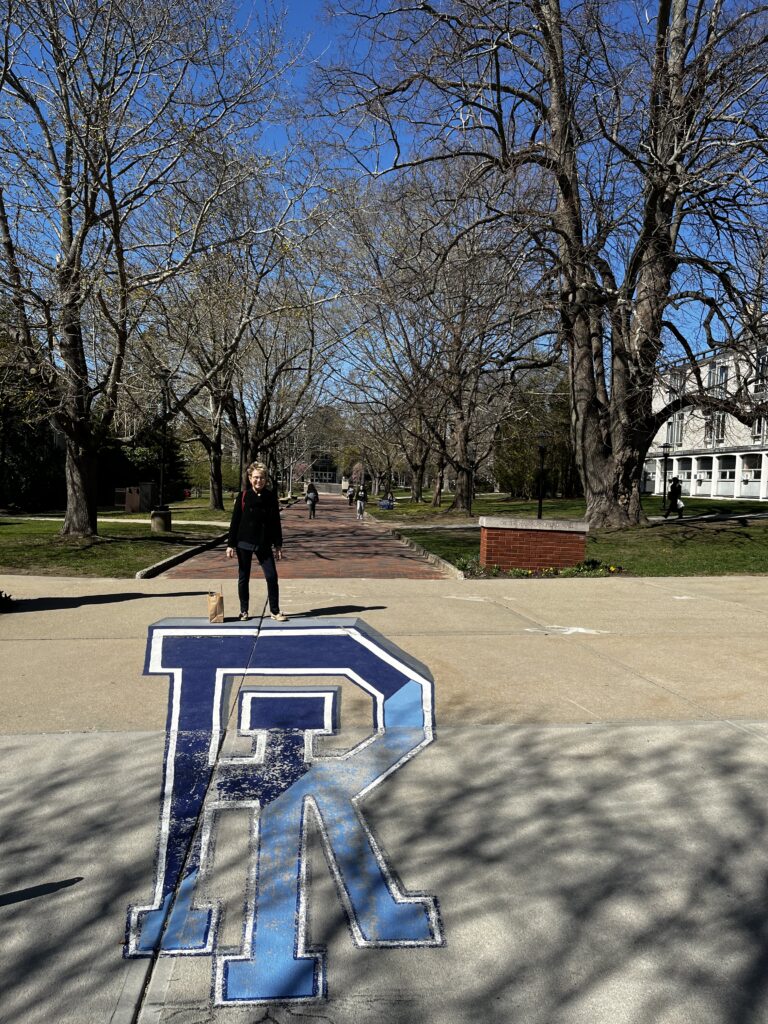U. Rhode Island embraces diverse learners
A Friendly Rhode Trip
How you get treated when you arrive on campus at the busiest time of the year tells you a lot about a place. The University of Rhode Island treated me, a single counselor, like someone special.

April 20 is a busy time at any campus: High school students on spring break are touring. College seniors are finalizing projects before graduation. And undecided students are attending admitted student days to figure out which school will get their commitment by May 1. All of this was true on this April 20, 2022, yet URI, with an undergraduate enrollment of just under 15,000, gave me time with the director of disability services and a one-to-one tour from Gabby, a lovely senior in the College of Health Sciences majoring in communicative disorders with a minor in psychology.
The students I encountered were friendly. Maybe they were smiling because the sun had come out after a bitter Tuesday, and spring finally seemed real. Maybe it’s because Gabby seemed to see friends around every corner. Whatever the reason, I got a sense of a friendly campus.
Disability, Access, and Inclusion
I had asked if I could speak to someone about URI’s disability services, and director Paige Ramsdell, Ph.D., took time out to answer my many questions. She’s been with the Office of Disability, Access, and Inclusion (DAI, previously Disability Services for Students) for 11 years. She’s passionate about the richness and diversity that the DAI population brings to the university. Ramsdell told me that of about 1700 students who have identified themselves to DAI, 30% have a mental health diagnosis, 20% have a learning difference, 20% have ADHD, and about 4% are students on the autism spectrum. In fact, they offer START URI, “a full-year program that provides a structured, transitional bridge from high school to college for students with autism spectrum diagnoses.” They also offer ASD students a three-day transition program just before the start of fall semester.
One of my primary questions involved adaptive technology, and Ramsdell proved to be on top of the tech. She told me that Dragon Nat and Kurzweil hadn’t adapted to the demands of the pandemic, so they’re out. Browser-based Glean is now in, and Google voice-to-text works well. Glean can record lectures, incorporate PowerPoint slides with the professor’s lecture timed to match the slides, and provide a transcript. In addition, the student can bookmark or make notes in Glean. It has made the need for peer note-takers obsolete. No more depending on a volunteer to take sufficient notes or waiting for the peer to upload notes.
DAI is integrated within the student center, not in a far-off corner of campus. The Academic Enhancement Center, open to all URI students, is close by, with a writing center staffed by trained peers, peer tutors for STEM courses, and academic skills assessments.
Students with a need for accommodations would do well here, providing they have a good grasp of their needs and a willingness to ask for what they need. While DAI helps students, Ramsdell said they expect students to be self-advocates.
The Campus and Living-Learning Residences
The campus is classically New England, with buildings constructed of granite dug on site. The LEED Silver Welcome Center upholds sustainability, evokes the old and mirrors the Rhode Island geography and the WWI grove of trees. The landscape architecture firm that designed New York’s Central Park also designed the quad at the center of URI. The Atlantic beaches and sailing mecca Newport lie only minutes away for sunning and sailing, but also for studying marine science either as an undergraduate or with the Graduate School of Oceanography.
URI organizes first-year dorms into living-learning communities (LLCs) based on the eight colleges within the university: Arts & Sciences, which includes the School of Communication and Media; Health Sciences; Engineering; Nursing; Pharmacy; Education & Professional Studies; Business; and Environment & Life Sciences. Pre-professional studies run the gamut: pre-law, pre-dental, pre-med, pre-physical therapy, pre-physician assistant, and pre-veterinary.
For a larger “medium-sized” school with 14,500 undergrads, the University of Rhode Island seems manageable, with support provided from Day 1 (see uri.edu/support).
First-year students have a network of support that starts where they live, in the living-learning communities (LLCs). Resident Academic Mentors, or RAMs (clever, since their mascot is the ram) are trained sophomores or older who live with the first-years. They keep office hours, organize study sessions, and schedule group activities. Resident Assistants (RAs) focus on the non-academic aspects of college life, helping freshmen navigate URI. Academic Partners serve as LLC leaders, facilitating LLC programs and events and meeting with students.
Programs and Items of Note
Sustainability is a component of 40 programs at URI, and the new president, Marc Parlange believes in fostering collaboration across disciplines, so sustainability isn’t limited to the College of Environment & Life Sciences.
Neuroscience is a new major with three tracks: psychology, pharmacy, and life sciences, a common pathway to medical school.
Data science is made up of an interdisciplinary team from seven of the eight colleges.
The Pharm. D. program is a direct-admit, six-year program leading to a Doctor of Pharmacy degree. It’s one of only about half a dozen colleges with such a program.
The University College for Academic Success helps students confirm or find their majors and minors. Interdisciplinary study is encouraged. Most majors can be easily transfered between colleges, with the exception of nursing.
The business college offers a B.S. and M.S. in textiles, fashion merchandising and design. In the small textile museum on campus, you can see Perry Ellis and Yves St. Laurent clothing from the 60s and 70s. Graduate students curated and installed the exhibit.
The College of Engineering has a new $150-million facility and takes advantage of its location with a major in ocean engineering.
Students studying at the School of Communication & Media have access to a $6.8 million media hub. The student-run newspaper, named “A Good Five-Cent Cigar,” publishes in print weekly.